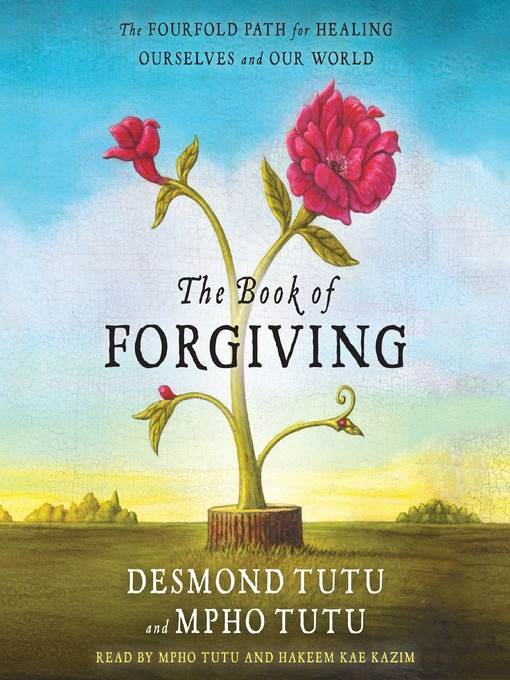
The Book of Forgiving
The Fourfold Path for Healing Ourselves and Our World
کتاب های مرتبط
- اطلاعات
- نقد و بررسی
- دیدگاه کاربران
نقد و بررسی

Resonant, heartfelt performances by the British-Nigerian actor Hakeem Kae Kazim and Archbishop Tutu's daughter, Mpho, will transport listeners in a visceral way to that place and time when so much healing was needed in South Africa. With calm intensity, Kazim delivers the author's melodic prose and thoughtful teachings; both narrators read the first-person stories of victims and perpetrators who are seeking peace from unthinkable crimes. It's hard to understate the power of this message as delivered in these strong, complex performances. The gripping sermons of Billy Graham come to mind as we hear the authors' invitations to hope and to become whole again by moving through a four-step process of forgiveness. In the aftermath of tragedy and evil, this is a spiritual path for healing broken hearts, especially for those who feel isolated in their suffering and need spiritual guidance to regain their humanity. T.W. � AudioFile 2017, Portland, Maine

Starred review from January 20, 2014
Though ostensibly retired from public life, Nobel Peace Prize–winner and emeritus archbishop Desmond Tutu still has much to say. His newest book on forgiveness in some ways extends and applies the lessons of his pathbreaking No Future Without Forgiveness (1999). Both books draw on his experience heading South Africa’s post-apartheid Truth and Reconciliation Commission, but this is freshly informed with experiences that include smaller slights and insults as well as more traumatic wrongs, among them the murder of the housekeeper of Mpho Tutu, daughter of Desmond Tutu. The father-daughter pair relate stories but also include instructions on how to forgive, as well as scientific and moral reasons to do so. No one is unforgiveable; it takes a moral icon such as Tutu to credibly assert this. The book may get a boost from the recent death of Nelson Mandela, about whom Tutu says, “It took 27 years for him to be transformed from an angry, unforgiving young radical into an icon of reconciliation…” This book belongs on nightstands, shelves, and altars everywhere. Agent: Lynn Franklin, Lynn C. Franklin Associates.

Starred review from February 15, 2014
No one, perhaps, now stands in higher esteem in the world as a spiritual leader than Tutu, 1984 Nobel Peace Prize winner, chair of South Africa's Truth and Reconciliation Commission, and a former archbishop. This book, his second collaboration with his daughter Mpho, follows on from his previous accounts of his life and his work with the commission but amounts to a guide to practical sainthood and a how-to on forgiveness. Forgiveness ought to be simple but is all but impossible for most, even in small things; the Tutus's recipe restores its simplicity. VERDICT Desmond Tutu's moral authority alone makes his books worth reading; this volume more than repays that trust with its deep wisdom. Churches and businesses will benefit from this--and so should governments.
Copyright 2014 Library Journal, LLC Used with permission.

February 15, 2014
A practical call for forgiveness from people who learned it the hard way. Nobel Peace Prize recipient and Anglican archbishop Tutu (God Is Not a Christian: And Other Provocations, 2011, etc.) teams up with his daughter, Mpho, also an Anglican priest, to advance the cause of forgiveness. Their work stems from a shared past steeped in South Africa's apartheid system. Mpho's experience is also informed by a personal tragedy: the murder of her family's housekeeper. For both authors, forgiveness has been a lifelong struggle, yet one which they both embrace and endorse. "There is nothing that cannot be forgiven, and there is no one undeserving of forgiveness," they write. Indeed, one of the authors' important points is that all people feel pain, and no one hurts another without having been a victim at some earlier point. They acknowledge that forgiveness is not easy; however, they are convinced that forgiveness offers peace, healing and an opening to a productive future. They guide readers through a "Fourfold Path" of forgiveness: telling the story, naming the hurt, granting forgiveness, and renewing or releasing the relationship. They also provide focus for individuals in need of another's forgiveness and those who need to forgive themselves. The book is almost entirely practical in focus, geared toward helping people come to grips with issues of anger, grief and loss. It includes meditations, rituals and journal exercises after each chapter. While potentially useful, the text is lightweight in relation to some of the examples of superhuman forgiveness punctuating the work--victims of grave crimes pardoning those who have caused such anguish. There is a disconnect between the gravitas of the surname Tutu in relationship to what is basically a self-help book. Tutu's No Future Without Forgiveness (1999) is a far weightier and more worthy discussion of the topic.
COPYRIGHT(2014) Kirkus Reviews, ALL RIGHTS RESERVED.

























دیدگاه کاربران